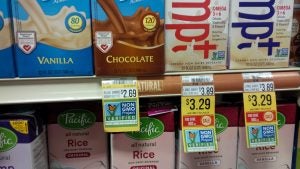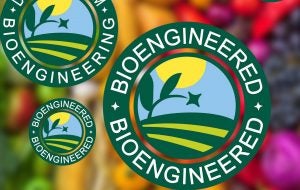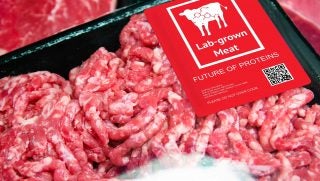Everyone is able to choose what they want to consume, that’s the good thing about the U.S. food system. There are almost too many options, and it can be hard to determine what food labels mean and what options are best for your family. But here’s why I don’t buy anything that says “non-GMO.”
First of all, let’s be real: There is no such thing as truly “non GMO.” Pretty much everything has been genetically modified through thousands of years of selective breeding, crossbreeding, and mutant breeding. There are other ways to genetically modify crops that are more consistent with what we think of when we hear GMO, such as transgenics and genome editing. (Scientifically speaking, you’re more likely to hear those methods referred to as “genetically engineered” or “bioengineered” instead of “genetically modified.)
The bottom line is that even things with a “non-GMO” label have been genetically modified.
But for the sake of accessibility and talking about the subject, I’ll continue to use “GMO” for what most
There’s also no real reason to avoid GMOs because those that make it to market are completely safe! GMOs are some of the most regulated and tested technologies in agricultural history. The U.S. Food and Drug Administration, Environmental Protection Agency, and Department of Agriculture all contribute to regulating and ensuring the safety of GMOs. There is no evidence that the GMOs we buy in grocery stores or at farmers markets are harmful, but there is tons of evidence showing that GMOs are safe and healthy.
GMOs are also a greatly important tool to increase resilience in crops, increase yields (and efficiency) and even improve nutritional content. In fact, genetic modification has decreased chemical pesticide use by 37 percent, increased crop yields by 22 percent, and increased farmer profits by 68 percent.
Since GMOs are safe for you and your family and have already done so much good, no one should be avoiding them at the grocery store.
There are only 12 GMO foods approved for use in the U.S. These crops are available in the United States: corn, soybeans, potatoes, papaya, summer squash, canola, alfalfa, apples, sugar beets, pink pineapple. Genetically engineered salmon and pork have also been approved for use in food, but they are not widely available so you’ll be unlikely to see them in your local grocery store. (A 13th GMO used in the U.S. is cotton.)
Of course not all varieties of each of these crops are genetically engineered. GMOs make up a majority of the soybeans, corn, sugar beets, canola, and cotton grown today. Most of this is used for animal food, but GMO crops are also used to make sugar, cornstarch, corn syrup, soybean oil, canola oil, and other food products. Other GMO crops, such as potatoes, papaya, summer squash, apples, pink pineapple and alfalfa are not widely grown, and most varieties of these crops that you purchase will not be genetically engineered.

Next up, let’s talk about “non-GMO” labels on meat. As mentioned previously, GMO salmon and pork has been approved for food use (and has been repeatedly proven to be completely safe), but it is not yet widely available. The GMO salmon (AquAdvantage) is more efficient and reaches growth markers faster than non-genetically engineered salmon.
Genetically engineered pork (from GalSafe pigs) is intended to eliminate alpha-gal sugar on the pigs’ cells. People with the alpha-gal syndrome may have allergic reactions to this alpha-gal sugar found in mammalian meat. Pork from these GE pigs is generally safe for people with alpha-gal syndrome to eat. This is one cool advancement!
There are no other GMO animal products available. This means that any “non GMO” label you see doesn’t mean anything since there is no genetically modified chicken, turkey, beef, eggs or milk. And as already stated, it is very rare to find any GE pork or seafood. Even though most GMOs are used for animal feed, this does not affect animal food products. DNA in GMO animal feeds does not transfer to the animal when they eat it. Animals that eat GMOs do not turn into GMOs. To quote the FDA, “If it did, an animal would have the DNA of any food it ate, GMO or not. In other words, cows do not become the grass they eat and chickens don’t become the corn they eat.”
Finally, I want to address “non-GMO” labels. One biggie, The Non-GMO Project verified label, has been around since 2010 and is not government regulated. It is an independently created marketing campaign disguised as a nonprofit that preys on consumers that want good, healthy food choices for themselves and their family. Companies that want the Non-GMO Project verified label on their food products pay to use the trademarked label. Even on their website, the Non-GMO Project claims that companies should get their products verified as non-GMO to increase sales. “GMO free” labels are not allowed, because even supposed “non-GMO” foods can contain a small amount of GMO products.
Maybe “non-GMO” should actually read “Non GMO JK LOL?”
The non-GMO label can also be put on pretty much anything, even food products and dietary supplements that don’t have a single ingredient with a GMO counterpart. (Like chicken or orange juice; there are no GMO chickens or oranges). The goal behind a Non-GMO Project verified label is not to provide consumers with information to make educated food choices, it’s to increase sales. What’s especially sad about non-GMO orange juice is that GMOs could actually save the orange industry from citrus greening disease, but the anti-GMO movement is getting in the way of some seriously big challenges facing the survival of the industry!
This is probably the most important to note for me to share — the unethical sales tactics of the $19 billion a year Non-GMO Project. They spend nearly $3 billion a year, leading with fear and disinformation campaigns to push their agenda, which goes against science, the planet, evidence and facts, to stoop to very low levels to create fear and doubt in the food supply. It’s just wrong for so many reasons.
“The Non-GMO Project label is not accurate, not informative, is misleading, and clutters labels up with red herrings that cannot fail to mislead consumers. They are clearly in violation of the federal Food, Drug and Cosmetic Act,” said one scientist in 2018 when a citizens petition was filed against The Non-GMO Project’s labeling standards. “I think the FDA should crack down on it and make The Non-GMO Project clean up its act. And if it can’t be cleaned up, I think it should be euthanized.”

Just in the last few years, the USDA has been charged with creating and regulating food labeling requirements for bioengineered food. The USDA defines a bioengineered food as “those that contain detectable genetic material that has been modified through certain lab techniques and cannot be created through conventional breeding or found in nature.” Foods that are or may be bioengineered are required to disclose this in a few different ways. These bioengineered foods will have a statement saying, “Contains a bioengineered food ingredient,” a specific symbol in black and white or color, a QR code with a link, or a phone number that consumers can text.
You may also see “derived from bioengineering,” which means the company has chosen to disclose that they are using highly refined ingredients that do not contain detectable modified genetic material in the finished product. If you really want to know if your food is genetically modified or bioengineered, look for this government regulated symbol, not the non-GMO label.
So what can you do?
If possible, avoid supporting companies that use the non-GMO label. It seems like this label is everywhere today and can be hard to avoid, but any time you can support a company that supports real science (aka, not using the “non GMO” label) it’s a step in the right direction. Also, talk about GMOs and the non-GMO food labels with those around you. Education is key in showing people why they shouldn’t show preference to anything that says “non-GMO.”
Michelle Miller, the “Farm Babe,” is an internationally recognized keynote speaker, writer, and social media influencer and travels full time to advocate for agriculture. She comes from an Iowa-based row crop and livestock farming background and now resides on a timber farm in North Central Florida.



